Current News
/ArcaMax

Senate confirms former Trump personal attorney for lifetime post
The Senate confirmed President Donald Trump’s controversial former personal attorney to a lifetime federal appeals court post Tuesday on a narrow party-line vote.
Emil Bove, who has served as a Justice Department official in the first few months of Trump’s second term, will take a lifetime post on the U.S. Court of Appeals for the 3rd ...Read more

Las Vegas mosquitoes test positive for West Nile virus, officials say
For the first time this year, a sample of mosquitoes in Las Vegas has tested positive for West Nile virus, the Southern Nevada Health District announced on Tuesday.
The health district said it identified mosquitoes in the 89123 ZIP code, in south Las Vegas north of Silverado Ranch Boulevard, that tested positive for the disease.
The ...Read more

US senate confirms Susan Monarez as director of the CDC
The U.S. Senate confirmed President Donald Trump’s nominee to lead the U.S. Centers for Disease Control and Prevention on Tuesday, as the federal agency adjusts to widespread layoffs and cancellations of public health programs.
Susan Monarez will take the helm as director of the Atlanta-based CDC following a 51 to 47 vote, after Republicans ...Read more

President Donald Trump's former lawyer Emil Bove was confirmed for a lifetime seat on a Philly-based federal appeals court
Emil Bove, a top Justice Department official and former personal attorney for President Donald Trump, was approved along party lines Tuesday night for a lifetime seat as a federal appeals judge in Philadelphia, capping a remarkably contentious process that will secure a prominent place in the judiciary for one Trump’s fiercest defenders.
The ...Read more

Missouri Republicans are talking about a redistricting push to help Trump, GOP
JEFFERSON CITY — Republican leaders in the Missouri Capitol are considering the possibility of holding a special session in September to redraw the state’s congressional boundaries.
President Donald Trump is pushing red states like Texas to redraw their maps ahead of the 2026 midterms in hopes of keeping GOP control of the narrowly divided ...Read more

County jails in metro Atlanta are funneling more immigrants to ICE
Jails in metro Atlanta are funneling a growing number of foreign-born inmates into the custody of Immigration and Customs Enforcement, data from sheriffs’ offices show.
The numbers are starkest in the region’s most immigrant-heavy jurisdictions.
From April to June, the Gwinnett County Sheriff’s Office received 218 requests from ICE to ...Read more

Scientist and green-card holder detained at San Francisco International Airport for more than a week, lawyer says
A Texas Lyme-disease researcher who came to the U.S. from South Korea at age 5 and is a longtime legal permanent resident was detained at San Francisco International Airport for a week, according to his lawyer.
Tae Heung "Will" Kim, 40, was returning from his brother's wedding in South Korea on July 21 when he was pulled out of secondary ...Read more

Package of law enforcement bills spurs intraparty fight among Democrats
The Senate floor erupted in a rare public intraparty bout Tuesday afternoon after Sen. Cory Booker, D-N.J., objected to the passage of a package of bipartisan bills on local law enforcement.
Booker’s objection to the passage of the seven bills held up legislation that covered everything from expanding grants to local law enforcement to cover ...Read more

Sean 'Diddy' Combs pushes for release on $50 million bond ahead of October sentencing
The legal team for Sean "Diddy" Combs has moved to get the disgraced music mogul released from prison ahead of his Oct. 3 sentencing. Less than a month ago, Combs was acquitted of the most damning charges in his high-profile sex-trafficking case.
Combs' defense attorneys on Tuesday filed a motion requesting the Bad Boy Records founder's ...Read more

Trump mounts new attack against wind projects on federal land
The Trump administration is considering halting all wind development on federal lands and in federal waters as the president expands his campaign against the renewable energy source he’s long criticized.
Interior Secretary Doug Burgum on Tuesday ordered a comprehensive review of the agency’s approval process for wind projects, including ...Read more

Why the family of 12-year-old S.C. amoeba victim wants an investigation
Clarence and Ebony Carr are seeking answers about the death of their son.
Jaysen Carr, a 12-year-old student at Hand Middle School in Columbia, South Carolina, died on July 18 from a rare infection of the Naegleria fowleri amoeba, which health officials say likely came from Lake Murray. His family hired attorney Tyler Bailey to lead an ...Read more
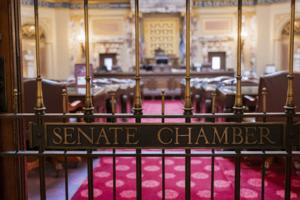
Gov. Tim Walz calls special elections for 2 vacant Senate seats
Gov. Tim Walz has called special elections in two Senate districts left vacant this month after the burglary conviction of Sen. Nicole Mitchell, DFL-Woodbury, and the death of Sen. Bruce Anderson, R-Buffalo.
Elections to fill the vacancies will take place on Nov. 4, the governor’s office announced on Tuesday. If necessary, special primary ...Read more
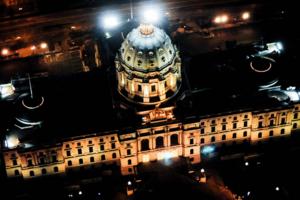
MN Capitol trespasser propped open door, found naked after-hours in Senate president's chair, charge says
A man found naked in the Minnesota Capitol Senate chamber late Friday was seated in the Senate president’s chair and told officers he was the governor, according to a felony charge filed Tuesday.
Minnesota State Patrol troopers arrested Dominic T. Peace, of Minneapolis, on Saturday night, after he’d been taken to the hospital twice for ...Read more

NJ criminal cases paused after challenge to top prosecutor's authority
The controversy over Alina Habba’s appointment as New Jersey’s top federal prosecutor grew this week as judges paused criminal cases amid a challenge by defendants who say she doesn’t legally hold the job.
Defendants facing narcotics charges are arguing that prosecutors can’t proceed with their case without a “validly appointed” U.S...Read more
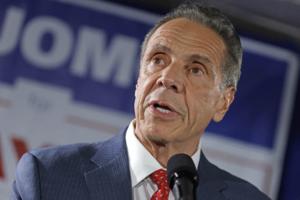
Cuomo cites NYC shooting in slamming Mamdani's 'defund the police' past
Andrew Cuomo believes Monday’s mass shooting in Midtown Manhattan will bring public safety to the forefront of this year’s mayoral race — and is already citing the tragedy in painting Democratic nominee Zohran Mamdani as someone who would be ill-equipped to oversee the NYPD.
Cuomo, who’s running as an independent against Mamdani in ...Read more

Trump administration moves to pull restrictions on oil and gas development in National Petroleum Reserve-Alaska
The Interior Department is taking additional steps to enable oil and gas drilling in the National Petroleum Reserve-Alaska, revoking Biden-era documents that called for expanding "Special Areas" that receive extra protection and are known for their unique wildlife and subsistence values.
The move continues the yearslong back-and-forth that has ...Read more

Minnesota eyes improvements to security at State Capitol, lawmakers' homes
Minnesota is considering expanding an emergency alert system for legislators and has ordered an outside review of security at the State Capitol in response to last month’s shootings of two lawmakers and a recent break-in.
The Minnesota House and Senate are also making changes amid concerns about lawmaker safety, allowing members to tap up to ...Read more
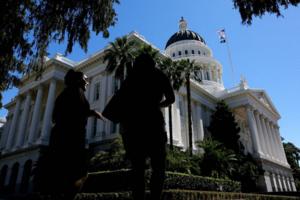
Gavin Newsom's redistricting gambit splits California Democrats
As California state lawmakers walked out of the Capitol for summer recess earlier this month, Gov. Gavin Newsom passed them a political hot potato in the form of a mid-decade redistricting proposal to counter a similar effort in Texas.
Newsom told reporters last week, after meeting with Texas Democratic lawmakers, that the California ...Read more
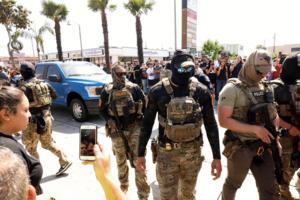
'We'll see you in court:' LA County wants to bar ICE agents from concealing identity
L.A. County took a first step Tuesday toward barring immigration officers from concealing their identities with neck gaiters and masks, though it's far from clear they'll be able to enforce the local ban on federal agents.
County supervisors voted 4-0 to ask attorneys to draft a rule that would bar all law enforcement officers — including ...Read more
News briefs
Trump hails NYPD after NYC shooting; Democrats blame lax gun laws
NEW YORK — President Donald Trump hailed the New York Police Department after the Midtown mass shooting as Democrats slammed lax gun laws for allowing the attacker to purchase the assault weapon used to kill four people including a police officer.
In between golf and a meeting...Read more
Popular Stories
- Republicans call Medicaid rife with fraudsters. This man sees no choice but to break the rules
- New York gunman, an LA high school football standout, left a note saying, 'Study my brain please'
- COVID rising in California. How bad will this summer be?
- Damaging, golf ball-size hail will fall more frequently because of climate change, researchers warn
- Summer violence touches parking lot prayer site in Chicago: 'There is a different way'





